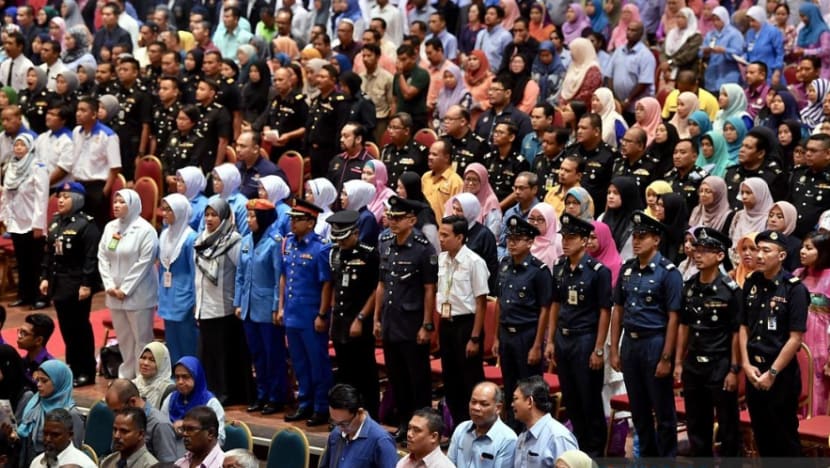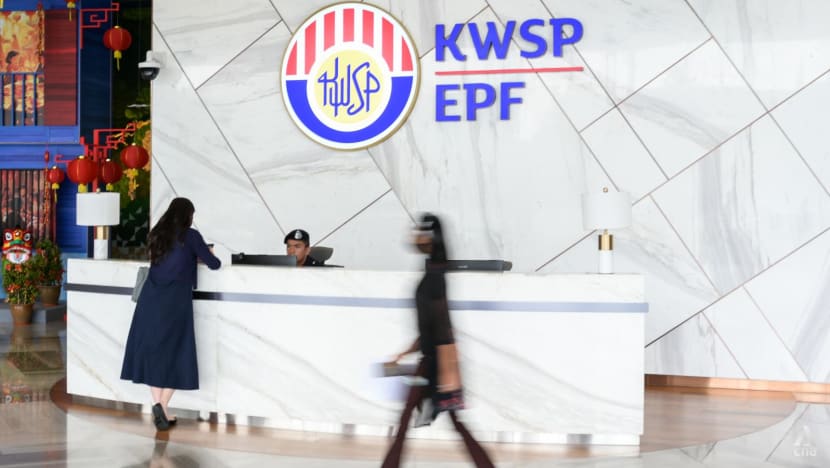Malaysia's plan to scrap pensions sparks backlash, calls to raise salaries of civil servants
The government wants to scrap pensions for new civil servants to avoid bankruptcy. Will promises to raise salaries be enough to sweeten the controversial plan?

Malaysia's civil servants include police officers, military personnel and teachers. (File photo: Bernama)

This audio is generated by an AI tool.
KUALA LUMPUR: When Aminah (not her real name) joined the civil service over a decade ago, many of her friends questioned her decision as the pay was considered low compared to the private sector.
But the 39-year-old mother of two was unswayed. She was drawn to the pension scheme, having seen how her grandmother was able to survive on it after her grandfather, who worked in the public works department, died.
In Malaysia, spouses and children under the age of 21 are entitled to benefits should a civil servant on the pension scheme die while in service.
“It was definitely one of the main reasons for me to sign up (with) the government although I knew that I would earn much less compared to my friends,” said Aminah, who requested anonymity as government servants are not authorised to speak to the media. The accountant estimates that in the private sector, she could be earning double her current salary.
Pensions, however, are set to be scrapped for new civil servants from this year as the government buckles under the ballooning financial burden caused by an increasing number of retirees and longer life expectancy.
Last month, Malaysia’s deputy prime minister Ahmad Zahid Hamidi announced the traditional pension system would be abolished moving forward, and that new civil service hires would instead contribute to the Employers Provident Fund (EPF).
Civil servants currently have a choice between the pension scheme and the EPF.
Under the EPF, a compulsory savings and retirement scheme, workers contribute 11 per cent of their monthly salaries while employers chip in with a minimum of 12 per cent of the workers’ salaries.
Workers may fully withdraw from the EPF from the age of 55.
The scrapping of pensions for new civil servants as well as politicians will help the government avoid bankruptcy in future, said Prime Minister Anwar Ibrahim.
Pension payouts have spiked in the last 15 years and are projected to grow. Pensions payments amounted to RM11.5 billion (US$2.2 billion) in 2010, and nearly tripled to RM31 billion last year.
In 2040, the government would have to spend an estimated RM120 billlion (US$25.2 billion), Mr Ahmad Zahid said.
The government’s announcement, which will have to be debated in Parliament and will entail constitutional amendments, will not affect existing civil servants.

PROPOSAL FACES RESISTANCE
But it has already drawn swift criticism. Former Member of Parliament and deputy minister Ong Kian Ming questioned the lack of discussion with stakeholders, while a teachers’ association said it would hurt the attractiveness of the civil service.
Mr Anwar has also had to fend off allegations that the move victimises Malays, given the majority of the country’s 1.7 million civil servants are Malay.
“There is definitely a political dimension to this. The issue is a very sensitive one as the majority of civil servants are Malay,” said Nusantara Academy for Strategic Research senior fellow Dr Azmi Hassan.
According to public pension manager Retirement Fund Incorporated (KWAP), 71 per cent of pensioners currently are Malay, 13 per cent are Chinese and 7.8 per cent are Indians.
Civil servants need to serve at least 10 years to qualify for the pension. In such a case, they would get a pension of 20 per cent of their last-drawn salary.
The lowest monthly pension amount for at least 25 years' service is RM1,000.
The highest amount is for civil servants who have served for 30 years; they are entitled to 60 per cent of their last-drawn salary.
Those who opt for the pension system are also eligible for a gratuity payment, depending on the length of their service.
“Even though the salaries are lower, the guarantee of pension is a reason why they are satisfied with the job. The pension system is considered to be lucrative once you retire,” said Dr Azmi Hassan.
The pension system is more stable and there is more peace of mind. You also won’t reach a situation where all your money is spent at once."
Opposing the move, the Congress of Unions of Employees in the Public and Civil Services (Cuepacs) said in a statement on Jan 25 that most civil servants consider the pension scheme to be the “best option”.
“Due to the current low salaries in the civil service, the EPF contribution scheme is seen as inadequate in helping civil servants build a substantial retirement fund,” said Cuepacs president Adnan Mat.
He said the government must ensure that civil servants’ salaries can provide a decent standard of living and contribute to their retirement savings.
The removal of pensions for new civil servants would lead more people to join the private sector, noted Malaysian Muslim Teachers Association president Mohd Azizee Hassan.
This would have negative impact on sectors such as education and health, which are crucial to the country, he said in a statement on Jan 26.
He called for engagement and “clear explanations” on the issue, and for salaries to be raised for civil servants if the EPF scheme becomes their only option.
Mr Anwar has said the government is committed to increasing salaries of civil servants. At the Perak Unity Government convention on Jan 28, he said the matter “cannot be delayed” despite the government facing “financial constraints”.
He said a comprehensive study on the public service remuneration system is expected to be completed within the next two months before being presented to the Cabinet for final approval, news portal FMT reported.
Mr Anwar also said the scrapping of pensions has been studied for a long time, and is needed to avoid the risk of the country going bankrupt and future generations facing problems.
"In fact, it has been studied for many years, if I'm not mistaken since the (1990s), but there is no political will to implement it,” he was quoted as saying by Bernama.
WHY REFORMS ARE NEEDED
Economists on the other hand support the proposal.
“Obviously there is fiscal pressure and a demographic trend where life expectancy is expected to increase. Pension reform is one part of it to mitigate any future possible economic outcomes,” said Mr Lee Heng Guie, an economist and executive director of the Socio-Economic Research Centre (SERC).
Official data shows the life expectancy of Malaysians has increased from an average of 71.2 years in 1991 to 74.8 years in 2023.
In Malaysia, part of the pension payments is funded by KWAP, which was established back in 2007 to assist in financing pension liabilities.
The government contributes 5 per cent of the total annual budgeted emolument (salaries and other returns from work) of Federal Government employees while statutory bodies, local authorities and agencies contribute 17.5 per cent of the basic salaries of their pensionable employees to KWAP monthly.
KWAP is an active investor in equities, fixed income securities, money market instruments and others.
Its gross investment income in 2021 was RM6.33 billion, while the total pensions and gratuities paid that year amounted to RM29.1 billion.
As of July last year, KWAP had assets totalling RM184.5 billion.
“It is still a long way from being able to fund all the pension payments,” Mr Lee pointed out.
Pension reforms are not unique to Malaysia, he added.
France, for instance, will raise the full-pension retirement age from 62 to 64 by 2030, and will require people to make social security contributions for 43 years to receive a full pension. The reforms ignited widespread protests last year.
“There will definitely be a lot of resistance from civil servants,” Mr Lee said.
The Malaysian government’s move has, so far, drawn a measured response from the opposition.
In a statement on Jan 24, Perikatan Nasional chairman Muhyiddin Yassin admitted that the growing cost of pension payments needed to be addressed but said that it must not come at the expense of government staff and their welfare.
"Any solution the government wants to implement cannot lead to the neglect of the welfare of civil servants or reducing the size of public services without taking into account the need to deliver services to the people efficiently, widely and effectively throughout the country,” he said.
"A DOUBLE-EDGED SWORD"
On whether someone would benefit more from a pension or an EPF plan, licensed financial planner Rajen Devadason told CNA it depends on how long the person lives.
“With Malaysia’s current official retirement age set at a relatively early 60, a person who dies early, say, before age 70 would see his estate end up better off with the EPF option, while a person who lives a long time, say past 85, would end up benefiting from the steady government pension,” he said.
The scrapping of pensions for new civil servants could remove a barrier holding back some civil servants from giving the private or other sectors a try.
Policy consultant Liyana Marzuki, 43, who used to work in the government as a lawyer, chose the EPF system to give herself the flexibility to take her retirement savings with her if she switched jobs.
She resigned after 10 years with the government to join the corporate sector in 2015.
“Should I have chosen the pension scheme, I wouldn’t have been eligible for it once I resigned from government service,” she said.
I earned more savings from EPF for my old age as compared to the pension scheme.”
Mrs Liyana supports the pension reform and said the government may need to impose higher tax rates or introduce new tax regimes to cover the increased cost of the civil service in future.
“This is a burden in the long run and the future generation will have to endure the pain,” she said.
Civil servant Aminah, meanwhile, is not particularly happy about her work environment or prospects. “At times, I feel stuck in my job,” she lamented.
But she’s keeping her eyes on the prize. “I have to endure this work for many more years to get the benefit at the end,” she said. “The pension is a double-edged sword.”


















